(完整版)初中英语比较级和最高级
初中英语语法知识:比较级与最高级
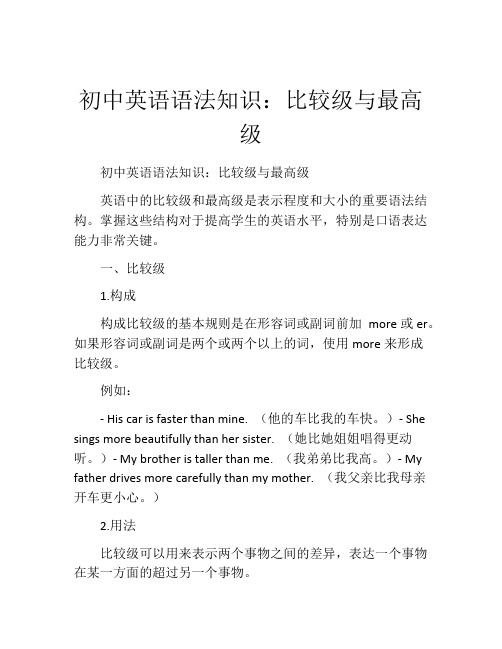
初中英语语法知识:比较级与最高级初中英语语法知识:比较级与最高级英语中的比较级和最高级是表示程度和大小的重要语法结构。
掌握这些结构对于提高学生的英语水平,特别是口语表达能力非常关键。
一、比较级1.构成构成比较级的基本规则是在形容词或副词前加more或er。
如果形容词或副词是两个或两个以上的词,使用more来形成比较级。
例如:- His car is faster than mine. (他的车比我的车快。
)- She sings more beautifully than her sister. (她比她姐姐唱得更动听。
)- My brother is taller than me. (我弟弟比我高。
)- My father drives more carefully than my mother. (我父亲比我母亲开车更小心。
)2.用法比较级可以用来表示两个事物之间的差异,表达一个事物在某一方面的超过另一个事物。
例如:- This book is more interesting than that one. (这本书比那本书更有趣。
)- The test was easier than I thought. (这次考试比我想象中的要容易。
)- Tom runs faster than John. (Tom跑步比John快。
)除此之外,比较级还可以用来表示同一事物在不同时期或不同情况下的变化,以及表示一个事件的过程。
例如:- The weather was colder yesterday. (昨天的天气比今天的更冷。
)- My English has improved a lot over the past year. (我在过去一年里英语进步了很多。
)- I’m f eeling better than I did this morning. (我现在感觉比早上好多了。
)- Susan is getting thinner and thinner. (Susan越来越瘦了。
[全]初中英语语法比较级和最高级知识点详解
![[全]初中英语语法比较级和最高级知识点详解](https://img.taocdn.com/s3/m/34cbcc7d3d1ec5da50e2524de518964bcf84d2bc.png)
[全]初中英语语法比较级和最高级知识点详解初中英语语法比较级和最高级知识点形容词、副词比较级和最高级一、定义。
比较级:两者之间的比较叫做比较级。
最高级:三者三者以上的比较叫做高级。
原级:没有比较,同级比较。
二、形容词、副词的比较级/最高级的构成。
1、单音节和部分双音节的词:(去,改,双,直)(1)以字母e结尾的形容词,去e加-er或-est;large——larger——largestXXXlate——later——latest(2)以“辅音字母+y”结尾的双音节词,先改“y”为“i”,再加happy——happier——happiestearly——earlier——earliest-er或-est;(3)辅-元-辅结构的单词(重读闭音节)的形容词,双写最后一个辅音字母再加er或者est;hot—hotter—hottestXXX——XXX——XXX(4)在末端加er大概est;strong——stronger——strongestslow——slower——slowest2、多音节词和部分双音节词:在词前加more或most。
delicious——more delicious——most deliciousbeautiful——more beautiful——most beautifulboring——more boring——most boringeasily——more easily——most easily3、不划定规矩变革(两个好,两个坏,两个多;一个小又少,另有一远和一老。
)good/well——better——XXX bad/ill/badly——worse——worstmuch/many——more——mostlittle——less——XXXXXX——XXXold——older/elder——XXX(farther是指距离或时间上"更远的''further是指程度上进一步的)4.特殊变化:既可以+er/est,又可以+more/most的单词有clever,handsome,polite,Simple,stupid,friendly。
初中比较级和最高级完整版

形容词副词比较级和最高级的构成 一、大多数形容词和副词有比较级和最高级的变化,即原级、比较级和最高级,用来表示事物的 等级差别。
原级即形容词的原形,比较级和最高级有规则变化和不规则变化两种。
1)单音节词加词尾 -er , -est 来构成比较级和最高级。
tall ( 高的 ) taller tallest great (巨大的)greater greatest 2)以不发音的 e 结尾的单音节词只加 -r,-stnice (好的) nicer large (大的) largerable (有能力的)abler nicest largest ablest 3)以一个辅音字母结尾的闭音节单音节词,双写结尾的辅音字母,再加 -er , -est big (大的) bigger biggesthot 热的 ) hotter hottest red 红色的 redder reddest 4)"以辅音字母+y"结尾的双音节词, 改y 为i ,再加-er , -est easy (容易的) easier busy (忙的) busier 5)以 ly 结尾的副词,除 easiest busiest early-earlier-earliest 其他都是加 more most. Slowly-more slowly-most slowly Bravely-more bravely-most bravely quickly-more quickly-most quickly 6)少数以 -er , -ow 结尾的双音节词未尾加 -er , -estclever (聪明的) cleverer cleverest narrow (窄的) narrower narrowest7) 其他双音节词和多音节词在前面加 important ( 重要的 ) moreimportant easily (容易地)more easily 8) 一些词的比较级和最高级,可以加 more , most 来构成比较级和最高级。
完整版)初中英语比较级和最高级专项练习题

完整版)初中英语比较级和最高级专项练习题形容词和副词的级别练1.Bob比Fred年轻,但比Fred高。
2.Ying Tian不如Yong Xian高。
3.几乎所有学生的脸都一样,但XXX看起来比假期前胖了。
4.母鸡和小鸡哪个更重?5.“XXX有多高?”她1.55米高。
XXX呢?”她只有1.40米高。
她比XXX矮得多。
她也是班里最矮的女孩。
”6.他不擅长数学,他的中文更差,他的英语是最差的。
7.XXX说XXX是世界上最善良的人。
8.他是班里最友好的人之一,我认为。
9.词典比故事书贵得多。
10.橙子比XXX稍大,但比西瓜小得多。
11.XXX.12.Sue is a little more beautiful than her sister.13.My room is not as big as my XXX's.14.- How difficult is physics?I'm not sure.Is it more difficult than math?I don't think so.15.- Annie plays the piano very well.Sue plays it better than Annie。
And Sally plays it the best.16.Saturday is the busiest day for me in a week.17.XXX.18.I think it'XXX.19.XXX I do.20.This book is not as XXX.21.Your classroom is XXX.22.Practice as much as you can.23.The more。
the better.24.Nowadays。
XXX XXX than any other subject.25.XXX bears。
making them the most XXX.1.He is as tall as I am。
初中英语知识点归纳比较级和最高级整理

初中英语知识点归纳比较级和最高级整理比较级和最高级是英语中用来比较两个或多个事物的形式。
掌握比较级和最高级的用法是学好英语的关键之一。
下面是关于初中英语比较级和最高级知识点的整理。
1. 形容词比较级的构成比较级一般由原级词尾 + er构成,如"bigger","quicker"。
如果形容词以字母“e”结尾,只需加上"r",如"nicer"。
如果形容词以重读闭音节结尾,且末尾只有一个辅音字母,则应双写该辅音字母,再加上"er",如"bigger"。
部分形容词的比较级是不规则的,如"good"变为"better","bad"变为"worse"等。
2. 形容词最高级的构成最高级一般由原级词尾 + est构成,如"biggest","quickest"。
如果形容词以字母“e”结尾,只需加上"st",如"nicest"。
如果形容词以重读闭音节结尾,且末尾只有一个辅音字母,则应双写该辅音字母,再加上"est",如"biggest"。
部分形容词的最高级是不规则的,如"good"变为"best","bad"变为"worst"等。
3. 比较级的用法比较级可以用来比较两个人或事物之间的差异。
我们可以使用"er than"这个结构来表示比较级,例如:"He is taller than his brother." (他比他兄弟高)。
当然,有些形容词比较级的句子结构会稍有变化,如:"My house is bigger than yours." (我的房子比你的大)。
(完整版)比较级和最高级

(完整版)比较级和最高级一、形容词的比较级和最高级变化规则;1、规则变化:(1) 单音节词和少数双音节词一般在词尾加er或est:如: small ---smaller --- the smallest(2) 以不发音的e字母结尾的加r,或st:如: late --- later --- the latest(3) 以辅音字母加y结尾的变y为I加er或est:如: easy --- easier --- the easiest(4)以一个辅音字母结尾的重读闭音节词双写最后一个辅音字母再加er或est:如: big --- bigger --- the biggest以er,ow结尾的双音节词加er 或est如: slow --- slower --- the slowest(5) 多音节词前加more或most, 副词最高级前省略the.如: important --- more important --- the most important2.不规则变化good / well --- better --- the best 好bad / badly / ill --- worse --- the worst 坏many / much --- more --- the most 多little --- less --- the least 少old --- older / elder --- the oldest / the oldest 老, 旧far --- farther / further --- the farthest / the furthest 远常见形容词比较级、最高级变化一览表1.在形容词词尾加上“er”“est”构成比较级、最高级:bright(明亮的)—brighter—brightest broad(广阔的)—broader—broadest cheap(便宜的)—cheaper—cheapest clean (干净的)—cleaner—cleanestclever(聪明的)—cleverer—cleverest cold(寒冷的)—colder—coldest cool(凉的)—cooler—coolest dark(黑暗的)—darker—darkest deep(深的)—deeper—deepest fast(迅速的)—faster—fastestfew(少的)—fewer—fewest great(伟大的)—greater—greatest hard(困难的,硬的)—harder—hardest high(高的)—higher—highest kind(善良的)—kinder—kindest light(轻的)—lighter—lightest long(长的)—longer—longest loud(响亮的)—louder—loudestlow(低的)—lower—lowest near(近的)—nearer—nearest new(新的)—newer—newest poor(穷的)—poorer—poorestquick(快的)—quicker—quickest quiet(安静的)—quieter—quietestrich(富裕的)—richer—richest short(短的)—shorter—shortestslow(慢的)—slower—slowest small(小的)—smaller—smallest smart(聪明的)—smarter—smartest soft(柔软的)—softer—softest strong(强壮的)—stronger—strongest sweet (甜的)—sweeter—sweetest tall(高的)-taller-tallest thick(厚的)—thicker—thickest warm(温暖的)—warmer—warmest weak(弱的)—weaker—weakest young(年轻的)—younger—youngest2.双写最后一个字母,再加上“er”“est”构成比较级、最高级:big(大的)—bigger—biggest fat(胖的)—fatter—fattesthot(热的)—hotter—hottest red(红的)—redder—reddestsad(伤心的)—sadder—saddest thin(瘦的)—thinner—thinnestwet(湿的)—wetter—wettest mad(疯的)—madder—maddest3.以不发音的字母e结尾的形容词,加上“r”“st”构成比较级、最高级:able(能干的)—abler—ablest brave(勇敢的)—braver—bravest close(接近的)—closer—closest fine(好的,完美的)—finer—finest large(巨大的)—larger—largest late(迟的)—later—latestnice(好的)—nicer—nicest ripe(成熟的)—riper—ripestrude(粗鲁的)—ruder—rudest safe(安全的)—safer—safest strange(奇怪的)—stranger—strangest wide(宽广的)—wider—widest wise(睿智的,聪明的)—wiser—wisest white(白的)—whiter—whitest4.以字母y结尾的形容词,把y改为i,再加上“er”“est”构成比较级、最高级:busy(忙碌的)—busier—busiest dirty(脏的)—dirtier—dirtiest dry(干燥的)—drier—driest early(早的)—earlier—earliest easy(容易的)—easier—easiest friendly(友好的)—friendlier—friendliest funny(好玩的)—funnier—funniest happy(开心的)—happier—happiest healthy(健康的)—healthier—healthiest heavy(重的)—heavier—heaviest hungry(饿的)—hungrier—hungriest lazy(懒惰的)—lazier—laziestlucky(幸运的)—luckier—luckiest naughty(调皮的)—naughtier—naughtiest noisy(嘈杂的)—noisier—noisiest pretty (美丽的)—prettier—prettiest silly(傻的)—sillier—silliest spicy(辣的)—spicier—spiciestthirsty(渴的)—thirstier—thirstiest ugly(丑的)—uglier—ugliest4.双音节、多音节形容词,在单词前面加上“more”“most”构成比较级、最高级:afraid(害怕的)—more afraid—most afraidbeautiful(美丽的)—more beautiful—most beautifulcareful(仔细的)—more careful—most carefulcheerful(开心的)—more cheerful—most cheerfulcrowded(拥挤的)—more crowded—most crowdeddangerous(危险的)—more dangerous—most dangerous delicious(美味的)—more delicious—most deliciousdifficult(困难的)—more difficult—most difficultexciting(令人兴奋的)—more exciting—most excitingexpensive(昂贵的)—more expensive—most expensivefamous(著名的)—more famous—most famousfrightened(受惊的)—more frightened—most frightened frightening(令人害怕的)—more frightening—most frighteninghard-working(勤奋的)—more hard-working—most hard-workinghelpful(有帮助的)—more helpful—most helpfulhonest(诚实的)—more honest—most honestimportant(重要的)—more important—most importantinteresting(有趣的)—more interesting—most interesting polite(有礼貌的)—more polite—most politeterrible(可怕的)—more terrible—most terribletired(累的)—more tired—most tired5.不规则变化的形容词:bad(坏的)—worse—worst good(好的)—better—bestfar(远的)—farther—farthest (far—further—furthest)ill(病的)—worse—worst little(少的)—less—leastmany(多的)—more—most much(多的)—more—most old(年老的)—older—oldest ( old—elder—eldest)well(好的,身体好的)—better—best一. 写出下列形容词或副词的比较级和最高级.bad ________________ ______________________________clean ________________ ______________________________ famous ______________ _______________________dirty _________________ ______________________________big __________________ _____________________________small _________________ ______________________________heavy _____________ ______________________little __________________ ______________________________hard __________________ ______________________________ happy _________________ ______________________________far ___________________ ______________________________ expensive _____________________ ________________________________ well _________________ ______________________________easy __________________ ______________________________ wide ___________________ _______________________________ young _________________ ________________________________ rude ___________________ ________________________________ cheap ___________________ _______________________________ ugly __________________ _________________________________ busy ___________________ ________________________________ old ____________________ _________________________________ noisy __________________ _________________________________ interesting _____________________ _______________________________ hot ____________________ _________________________________ cold ___________________ _________________________________ many __________________ ________________________________ bright __________________ _______________________________ boring __________________ _______________________________ difficult _______________________ ________________________________ beautiful _______________________ _____________________________thin _____________________ _______________________________ good ____________________ _______________________________ strong____________________ ______________________________ high _________________ _______________________warm ________________ _______________________late __________________ _______________________weak _________________ ______________________tall ___________________ ______________________short __________________ ______________________loud ___________________ ______________________lazy ___________________ ______________________quick __________________ ______________________angry __________________ ______________________clever __________________ ______________________smart __________________ ______________________low ____________________ __________________二、选择填空1. Which does Jimmy like _____ , Chinese or Art?A. wellB. bestC. betterD. much2. The Changjiang River is one of _____ in the world.A. the longest riverB. longest riversC. the longest riversD. longer rivers3. _____ of the two women is Mrs Brown.A. The beautifulB. The more beautifulC. More beautifulD. The most beautiful4. My mooncake is nicer _____ his.A. likeB. withC. forD. than5. You are fatter than _____ .A. heB. hisC. himD. he is tall6. He jumps _____ of the three.A. farB. furtherC. farthestD. furthest7. My hair is longer than _____ .A. my sisterB. KateC. my brother’sD. Lucys’8. There are _____ paper here .Please bring some.A. littleB. lessC. fewerD. a little9. The pen is _____ than that one.A. more cheapB. cheapC. much cheaperD. quite cheaper10.Tom speaks Chinese _____ better than Jimmy.A. moreB. veryC. a lot ofD. much11.There are _____ girls in Class Two than in Class Four.A. moreB. nicestC. mostD. best12.It’s too _____ for you to do that.A. easyB. more dangerousC. harderD. the easiest13.Who has _____ apples now, Jim, Lily or Lucy?A. muchB. biggestC. betterD. the most14.You have more rulers than me. But _____ are nicer than _____ .A. mine, yoursB. mine, yourC. my, yoursD. my, your15.Tingting is _____ than Meimei, but Meimei is _____ than Tingting.A. all, strongerB. taller, strongestC. tallest, strongD. taller, stronger16.Mother is _____ in my family.A. busyB. busierC. the busiestD. more busy17.There are _____ in the park on Sunday.A. more childrenB. a lot of peopleC. much men and womenD. many peoples18.-This blue sweater is too big for me .-Will you please show me a _____ one?A. smallB. smallerC. the smallestD. smallest19.No one is _____ Mary in the class.A. so tallest asB. as taller asC. so high asD. so tall as20. This bike is _____ than that one.A. twenty yuan dearB. twenty yuan dearerC. dear twenty yuanD. dearer twenty yuan[参考答案] CCDDA CDBCD AADAD CBBDB三、用所给词的适当形式填空1.Your classroom is _____ (wide) and _____ (bright) than ours.2.There are _____ (few) hours of sunlight a day in winter than in summer.3.Which do you like _____ (well) , maths or chemistry?4.This is the _____ (good) film I have ever seen.5.Africa is the second _____ (large) continent.6.What he said made his mother much _____ (angry) .7.I’m not as _____ (careful) as he.8.We’ve got as _____ (many) books as we need.9.Pratice as _____ (much) as you can.10.They have done _____ (much) work with _____ (little) money.11.You’re the _____ (kind) person I’ve ever met.12.He is _____ (young) than his two sisters.13.The _____ (old) I get, the _____ (strong) I seem to feel.14.The weather is getting _____ (warm) and _____ (warm) .15.Summer is _____ (hot) season of the year.[参考答案] 1. wider, brighter 2. fewer 3. better 4. best 5. largest 6. angry 7. careful 8. many 9. much 10. more, less 11. kindest 12. younger 13. older, stronger, 14. warmer, warmer 15. the hottest。
(完整版)初中英语比较级和最高级
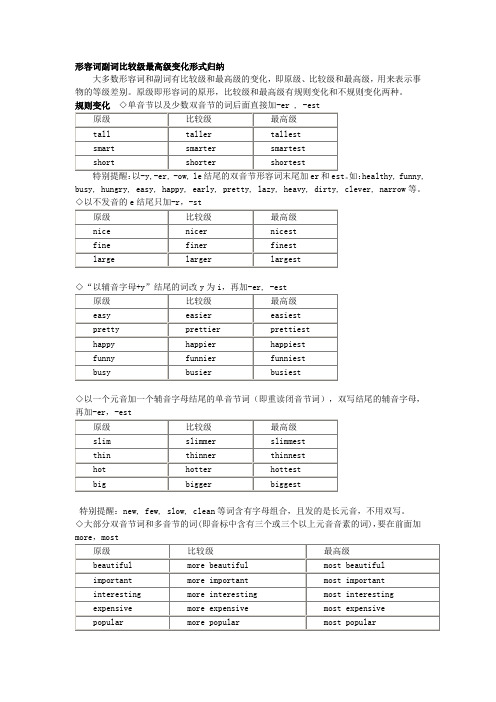
◇下列形容词和副词没有比较级和最高(即表示“最高程度”或“绝对状态”的形容词和副词没有比较级和最高级)empty, wrong, perfect, unique, extreme, excellent, favourite, true, right, correct, extremely ...形容词副词比较级最高级使用注意事项◇比较应在同类事物之间进行。
误:Your English is better than me.正:Your English is better than mine.◇比较级前可以有一个表示程度的状语,最常见的三大修饰词是:a little, much, even。
以下单词也可用来修饰:any, far, still, a lot, yet, rather。
My sister is a little taller than me.Their house is much larger than ours.另外,名词短语也可修饰比较级,说明程度。
I’m three years older than he.特别提醒:very, quite, too不可修饰比较级。
◇避免重复使用比较级。
误:He is more kinder to small animals than I.正:He is much kinder to small animals than I.误:He is more cleverer than his brother.正:He is cleverer than his brother.◇比较要符合逻辑,在同一范围内比较时,避免将主语含在比较对象中,这时需使用other来排除自身。
误:China is larger that any country in Asia.正:China is larger than any other country in Asia.误:John studies harder than any student in his class.正:John studies harder than any other student in his class.正:John studies harder than any of the other students in his class.正:John studies harder than anyone else in his class.◇比较要遵循前后一致的原则,注意前后呼应。
完整版)初中英语比较级和最高级的用法

完整版)初中英语比较级和最高级的用法英语语法——比较级和最高级的用法在英语中,我们通常使用以下方式表示比较级和最高级:在形容词或副词前加more(如more natural。
XXX)或者加上后缀-er(newer。
sooner)。
这些方式典型地表示形容词或副词所表示的质量、数量或关系的增加。
在英语句子中,将两个主体进行比较的方法被称为“比较句型”。
其中,“A比B 更……”的表达方式称为比较级,“A最……”的表达方式则称为最高级。
构成句子的方式是将形容词或副词变成比较级或最高级的形态。
一、形容词和副词的比较级和最高级的构成规则1.一般单音节词和少数以-er、-ow结尾的双音节词,比较级在后面加-er,最高级在后面加-est。
例如:small → smaller → smallest。
short → shorter → shortest。
tall → taller → tallest。
great → greater → greatest。
2.以不发音e结尾的单音节词,比较级在原级后加-r,最高级在原级后加-st。
例如:large → larger → largest。
nic e → nicer → nicest。
able → abler → ablest。
3.在重读闭音节(即:辅音+元音+辅音)中,先双写末尾的辅音字母,比较级加-er,最高级加-est。
例如:big → bigger → biggest。
hot → XXX → hottest。
fat → fatter → fattest。
4.以“辅音字母+y”结尾的双音节词,把y改为i,比较级加-er,最高级加-est。
例如:easy → easier → easiest。
heavy → XXX → XXX。
b usy → busier → busiest。
happy → happier → happiest。
5.其他双音节词和多音节词,比较级在前面加more,最高级在前面加most。
(完整版)初中英语语法形容词和副词的比较级和最高级

注意:有些形容词,如dead, empty, round, sure, woolen 等受本身含义的限制,没有比较级。
相关结构1)原级比较:肯定句as….as…., 否定句not so / as….as…..2)比较句:比较级+than….或more (less)+adj ….than…..The furniture in this shop is less beautiful than that in that shop.(注意代词that的用法)3)比较级+and+比较级或more and more+比较级“越来越… ”richer and richer, more and more interesting4)The more….., the more…..“越…,越…”The more you look at the picture, the better you will like it.5) 比较级+than any other +n. (单)(适用于范围一致时)(all) other +n.(复)any +n.(单) (适用于范围不一致时)He is taller than any other student / all other students in his class.any student in my class.6) 倍数表达法。
A is three(four, etc.)times the size(height, length etc.)of B.A is three(four, etc.)times as big(high, long, etc.)as B.A is three (four, etc.)times bigger(higher, longer, etc.)than B.用times 表倍数通常用于三倍以上,两倍可以用twice或double.The new building is four times the size (the height)of the old one.这座新楼比那座旧楼大三倍(高三倍)。
初中英语知识归纳形容词和副词的比较级和最高级构成

初中英语知识归纳形容词和副词的比较级和最高级构成形容词和副词是英语中常见的词性,用来修饰名词或者动词等。
比较级和最高级是形容词和副词构成的两种特殊形式,在句子中用来表达两个或多个事物之间的比较关系。
本文将对初中英语知识中的形容词和副词的比较级和最高级进行归纳和总结。
一、形容词的比较级和最高级构成方式1. 一般情况下,在形容词的原级后面加上"-er"构成比较级,加上"-est"构成最高级。
例如:原级:tall(高的)比较级:taller(更高的)最高级:tallest(最高的)2. 以"e"结尾的形容词,在原级后面只需加上"-r"和"-st"。
例如:原级:large(大的)比较级:larger(更大的)最高级:largest(最大的)3. 以辅音字母+y结尾的形容词,把"y"变为"i",再加上"-er"和"-est"。
例如:原级:happy(快乐的)比较级:happier(更快乐的)最高级:happiest(最快乐的)4. 以重读闭音节结尾,并且末尾只有一个辅音字母的形容词,要双写这个辅音字母,再加上"-er"和"-est"。
例如:原级:big(大的)比较级:bigger(更大的)最高级:biggest(最大的)5. 部分形容词的比较级和最高级是不规则的,需要特殊记忆。
例如:原级:good(好的)比较级:better(更好的)最高级:best(最好的)二、副词的比较级和最高级构成方式1. 大多数副词的比较级和最高级构成方式与形容词相同,在副词的原级后面加上"-er"和"-est"。
例如:原级:quickly(快速地)比较级:more quickly(更快地)最高级:most quickly(最快地)2. 以"e"结尾的副词,在原级后面只需加上"-r"和"-st"。
(完整版)英语比较级和最高级
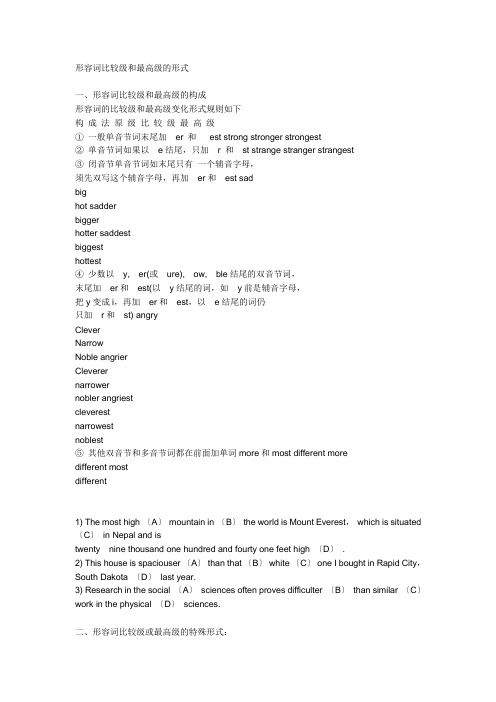
形容词比较级和最高级的形式一、形容词比较级和最高级的构成形容词的比较级和最高级变化形式规则如下构成法原级比较级最高级①一般单音节词末尾加er 和est strong stronger strongest②单音节词如果以e结尾,只加r 和st strange stranger strangest③闭音节单音节词如末尾只有一个辅音字母,须先双写这个辅音字母,再加er和est sadbighot sadderbiggerhotter saddestbiggesthottest④少数以y,er(或ure),ow,ble结尾的双音节词,末尾加er和est(以y结尾的词,如y前是辅音字母,把y变成i,再加er和est,以e结尾的词仍只加r和st) angryCleverNarrowNoble angrierCleverernarrowernobler angriestcleverestnarrowestnoblest⑤其他双音节和多音节词都在前面加单词more和most different moredifferent mostdifferent1) The most high 〔A〕mountain in 〔B〕the world is Mount Everest,which is situated 〔C〕in Nepal and istwenty nine thousand one hundred and fourty one feet high 〔D〕 .2) This house is spaciouser 〔A〕than that 〔B〕white 〔C〕one I bought in Rapid City,South Dakota 〔D〕last year.3) Research in the social 〔A〕sciences often proves difficulter 〔B〕than similar 〔C〕work in the physical 〔D〕sciences.二、形容词比较级或最高级的特殊形式:1. 三个或三个以上音节的形容词只能加more和most只能说more beautiful而不能说beautifuller; 只能说the most beautiful而不能说beautifullest。
初中英语语法之形容词比较级和最高级
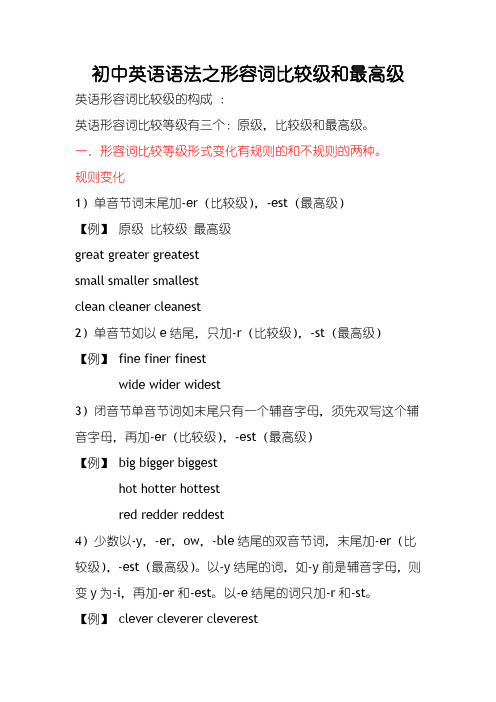
初中英语语法之形容词比较级和最高级英语形容词比较级的构成:英语形容词比较等级有三个:原级,比较级和最高级。
一.形容词比较等级形式变化有规则的和不规则的两种。
规则变化1)单音节词末尾加-er(比较级),-est(最高级)【例】原级比较级最高级great greater greatestsmall smaller smallestclean cleaner cleanest2)单音节如以e结尾,只加-r(比较级),-st(最高级)【例】fine finer finestwide wider widest3)闭音节单音节词如末尾只有一个辅音字母,须先双写这个辅音字母,再加-er(比较级),-est(最高级)【例】big bigger biggesthot hotter hottestred redder reddest4)少数以-y,-er,ow,-ble结尾的双音节词,末尾加-er(比较级),-est(最高级)。
以-y结尾的词,如-y前是辅音字母,则变y为-i,再加-er和-est。
以-e结尾的词只加-r和-st。
【例】clever cleverer cleverestnarrow narrower narrowestable abler ablesteasy easier easiest5)其它双音节和多音节词皆在前面加单词more和most。
【例】careful --more careful --most carefuldifficult --more difficult-- most difficultdelicious--more delicious-- most delicious不规则变化原级比较级最高级good/well better bestbad worse worstmany/much more mostlittle less leastfar farther/further farthest/furthest注:有些形容词一般没有比较等级。
初中英语知识点:比较级和最高级
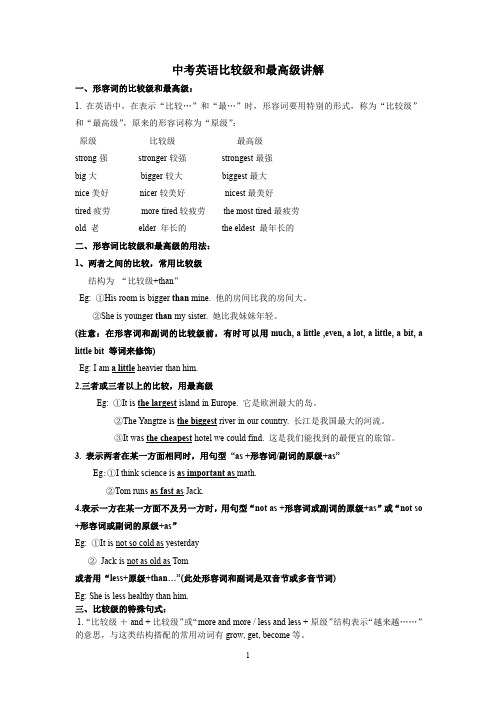
中考英语比较级和最高级讲解一、形容词的比较级和最高级:1.在英语中,在表示“比较…”和“最…”时,形容词要用特别的形式,称为“比较级”和“最高级”,原来的形容词称为“原级”:原级比较级最高级strong强stronger较强strongest最强big大bigger较大biggest最大nice美好nicer较美好nicest最美好tired疲劳more tired较疲劳the most tired最疲劳old老elder年长的the eldest最年长的二、形容词比较级和最高级的用法:1、两者之间的比较,常用比较级结构为“比较级+than”Eg:①His room is bigger than mine.他的房间比我的房间大。
②She is younger than my sister.她比我妹妹年轻。
(注意:在形容词和副词的比较级前,有时可以用much,a little,even,a lot,a little,a bit,a little bit等词来修饰)Eg:I am a little heavier than him.2.三者或三者以上的比较,用最高级Eg:①It is the largest island in Europe.它是欧洲最大的岛。
②The Yangtze is the biggest river in our country.长江是我国最大的河流。
③It was the cheapest hotel we could find.这是我们能找到的最便宜的旅馆。
3.表示两者在某一方面相同时,用句型“as+形容词/副词的原级+as”Eg:①I think science is as important as math.②Tom runs as fast as Jack.4.表示一方在某一方面不及另一方时,用句型“not as+形容词或副词的原级+as”或“not so +形容词或副词的原级+as”Eg:①It is not so cold as yesterday②Jack is not as old as Tom或者用“less+原级+than…”(此处形容词和副词是双音节或多音节词)Eg:She is less healthy than him.三、比较级的特殊句式:1.“比较级+and+比较级”或“more and more/less and less+原级”结构表示“越来越……”的意思,与这类结构搭配的常用动词有grow,get,become等。
中考英语常见副词形容词比较级最高级单词归纳总结

中考英语常见副词形容词比较级最高级单词归纳总结一、目录1.中考英语常见副词形容词比较级最高级单词归纳总结2.不规则变化词比较级最高级3.特殊用法比较级最高级4.常用句型总结5.易混淆词汇辨析6.语法考点解析二、中考英语常见副词形容词比较级最高级单词归纳总结1.副词比较级最高级:more,most;less,least;fairly,quite;hardly,scarcely;again,once more;fast,faster,fastest;early,earlier,earliest;high,higher,highest;late,later,latest;near,nearer,nearest等。
2.形容词比较级最高级:big,bigger,biggest;small,smaller,smallest;hot,hotter,hottest;red,redder,reddest;beautiful,more beautiful,most beautiful等。
3.不规则变化词比较级最高级:good,better,best;badly,worse,worst;many,more,most等。
4.特殊用法比较级最高级:as...as中间用形容词或副词原级;the+比较级+ofthe two/in the pair表示两者中比较...的一个;the+序数词+比较级表示第几...等。
三、常用句型总结1.The+比较级...,the+比较级...越...越...2.比较级+than+any other+单数名词/any of+复数名词/any+单数名词表示最高级的含义。
3.比较级+than+the other+单数名词/the other+复数名词表示比较级的含义。
4.比较级+than+同一主语的其他动词表示比较级的含义。
5.The+比较级+主语+谓语表示比较级的特殊用法。
四、易混淆词汇辨析1.more和many的区别:more修饰可数名词复数或不可数名词,表示更多;many修饰可数名词复数。
初中英语比较级和最高级总结

初中英语比较级和最高级总结绝大多数形容词有三种形式 ,原级 ,比较级和最高级 , 以表示形容词说明的性质在程度上的不同。
形容词的原级 : 形容词的原级形式就是词典中出现的形容词的原形。
例如:poor tall great glad bad形容词的比较级和最高级 : 形容词的比较级和最高级形式是在形容词的原级形式的基础上变化的。
分为规则变化和不规则变化。
规则变化如下 :1)单音节形容词的比较级和最高级形式是在词尾加-er 和 -est 构成。
great ( 原级 )(比较级 )(最高级 )2)以 -e 结尾的单音节形容词的比较级和最高级是在词尾加-r 和 -st 构成。
wide ( 原级 )(比较级 )(最高级 )3)少数以 -y, -er, -ow, -ble 结尾的双音节形容词的比较级和最高级是在词尾加-er 和 -est 构成。
clever( 原级 )(比较级 )(最高级 )4) 以 -y 结尾 ,但 -y 前是辅音字母的形容词的比较级和最高级是把-y 去掉 ,加上-ier 和-est 构成 .happy ( 原形 )( 比较级 )(最高级 )5)以一个辅音字母结尾其前面的元音字母发短元音的形容词的比较级和最高级是双写该辅音字母然后再加-er 和-est 。
big ( 原级 )(比较级 )(最高级 )6) 双音节和多音节形容词的比较级和最高级需用more和most加在形容词前面来构成。
beautiful ( 原级 )?(比较级 )(比较级 )difficult (原级)(最高级 )(最高级 ).常用的不规则变化的形容词的比较级和最高级:原级 ------比较级------ 最高级good------better------bestmany------more------mostmuch------more------mostbad------worse------worstfar------farther, further------farthest, furthest形容词前如加less和least则表示"较不"和"最不形容词比较级的用法 :形容词的比较级用于两个人或事物的比较,其结构形式如下 :主语 +谓语 (系动词 )+ 形容词比较级 +than+对比成分。
初中英语形容词和副词的比较级和最高级大全(各版本通用)
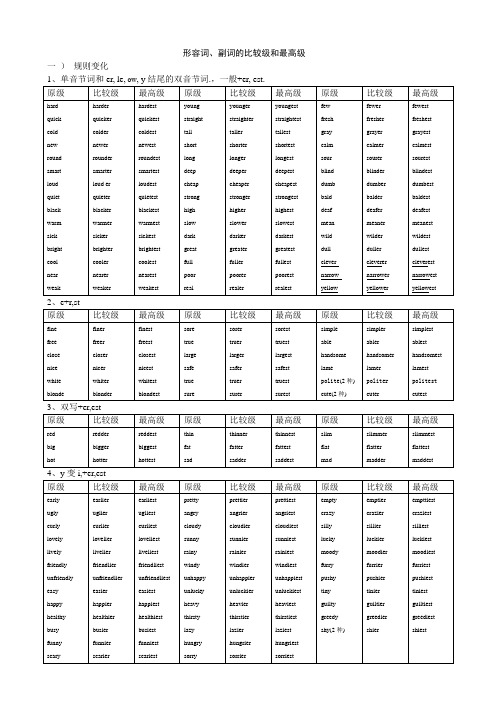
more completely
more quickly
more quietly
more carefully
more beautifully
more comfortably
more useful
more famous
more beautiful
more creative
more serious
most talented
most pleased
most crowded
most disappointed
most famous
most expensive
most inexpensive
most honest
most wonderful
most interesting
most fantastic
lazy
hungry
sorry
prettier
angrier
cloudier
sunnier
rainier
windier
unhappier
unluckier
heavier
thirstier
lazier
hungrier
sorrier
prettiest
angriest
cloudiest
sunniest
rainiest
beautiful
creative
serious
outgoing
amazing
awful
exciting
excited
interested
talented
pleased
crowded
disappointed
初中英语形容词和副词的比较级和最高级大全(各版本通用)

pleasant
unpleasant
similar
suitable
convenient
realistic
modest
natural
athletic
casual
casually
specifically
educational
common(2种)
often(2种)
stupid(2种)
gradually
most comfortably
most useful
most famous
most beautiful
most creative
most serious
most outgoing
most amazing
most awful
most exciting
most excited
most interested
beautiful
creative
serious
outgoing
amazing
awful
exciting
excited
interested
talented
pleased
crowded
disappointed
famous
expensive
inexpensive
honest
wonderful
interesting
more inexpensive
more honest
more wonderful
more interesting
more fantastic
more delicious
more difficult
- 1、下载文档前请自行甄别文档内容的完整性,平台不提供额外的编辑、内容补充、找答案等附加服务。
- 2、"仅部分预览"的文档,不可在线预览部分如存在完整性等问题,可反馈申请退款(可完整预览的文档不适用该条件!)。
- 3、如文档侵犯您的权益,请联系客服反馈,我们会尽快为您处理(人工客服工作时间:9:00-18:30)。
◇下列形容词和副词没有比较级和最高(即表示“最高程度”或“绝对状态”的形容词和副词没有比较级和最高级)empty, wrong, perfect, unique, extreme, excellent, favourite, true, right, correct, extremely ...形容词副词比较级最高级使用注意事项◇比较应在同类事物之间进行。
误:Your English is better than me.正:Your English is better than mine.◇比较级前可以有一个表示程度的状语,最常见的三大修饰词是:a little, much, even。
以下单词也可用来修饰:any, far, still, a lot, yet, rather。
My sister is a little taller than me.Their house is much larger than ours.另外,名词短语也可修饰比较级,说明程度。
I’m three years older than he.特别提醒:very, quite, too不可修饰比较级。
◇避免重复使用比较级。
误:He is more kinder to small animals than I.正:He is much kinder to small animals than I.误:He is more cleverer than his brother.正:He is cleverer than his brother.◇比较要符合逻辑,在同一范围内比较时,避免将主语含在比较对象中,这时需使用other来排除自身。
误:China is larger that any country in Asia.正:China is larger than any other country in Asia.误:John studies harder than any student in his class.正:John studies harder than any other student in his class.正:John studies harder than any of the other students in his class.正:John studies harder than anyone else in his class.◇比较要遵循前后一致的原则,注意前后呼应。
The population of Shanghai is larger than that of Beijing.It is easier to make a plan than to carry it out.◇序数词通常只修饰最高级。
Africa is the second largest continent.The Yellow River is the second longest river in China.This is the third most popular song of Michael Jackson.◇为避免重复,我们通常用that, those, one, ones代替前面出现的名词。
that代替可数名词单数和不可数名词,those代替可数名词复数。
one既可指人又可指物,只能代替可数名词。
The weather in China is different from that in America.The book on the table is more interesting than that(或the one)on the desk.A box made of steel is stronger than one made of wood.误:In winter, the weather of Beijing is colder than it of Shanghai.正:In winter, the weather of Beijing is colder than that of Shanghai.◇“否定词 + 比较级”相当于最高级。
----Wait until we get a satisfactory reply, will you?----I couldn't agree more. The idea sounds great to me.Nothing is so easy as this. =Nothing is easier than this. =This is the easiest thing.◇比较级前一般不加冠词。
但表示两者中较突出者,且比较级后又有名词或出现了of the two,这时比较级前一定要加the。
He is the taller of the two.Of the two jobs,he chose the harder.Which is the younger one, Lily or Lucy?试比较:Which is larger, Canada or Australia?Which is the larger country, Canada or Australia?She is taller than her two sisters.She is the taller of the two sisters.◇不含than 的比较级前可加不定冠词修饰,构成“a/an+比较级+单数可数名词”表示“一个更……的人/物”。
Why don’t you use a sharper knife? 你为什么不用一把更锋利的刀呢?◇比较级than 后应用人称代词的主格,但非正式语体中常用宾格。
He is taller than I/me.◇为避免重复,比较级中同样的动词用助动词do, does, did替代。
I spend less time doing homework than John does.She tells more funny jokes than we do.以下内容不是初中教学的重点,仅供拓展之用。
◇形容词most前面没有the,不表示最高级的含义,只表示“非常”。
It is a most important problem. =It is a very important problem.◇倍数表达法▲ A is three(four, etc.)times the size(height, length etc.)of B.The new building is four times the size(the height)of the old one.这座新楼是那座旧楼的四倍大(高)/这座新楼比那座旧楼大(高)三倍。
▲A is three(four, etc.)times as big(high, long, etc.)as B.Asia is four times as large as Europe. 亚洲是欧洲的四倍大/亚洲比欧洲大三倍。
▲A is three (four, etc.)times bigger(higher, longer, etc.)than B.Your school is three times bigger than ours.你们的学校比我们的学校大三倍。
用times表倍数通常用于三倍以上,两倍可以用twice或double.形容词副词比较级最高级重点句型归纳◇句型一:形容词或副词比较级+than…□注意事项:该句型为比较级的最基本句型。
只要看到than,即可确定前面使用比较级。
He is taller than I am.The boy does his homework more carefully than the girl.◇句型二:less + 形容词的原级 + than□注意事项:该句型表示“不如、不及”,特别需要注意的是,less本身就是little的比较级,后面必须跟形容词的原级,否定就造成了比较级的重复使用。
This computer is less expensive than that one.◇句型三:as +形容词或副词的原级+ as□注意事项:该句型表示对比的两者程度相当,as之间必须跟形容词或副词的原级,决不能使用比较级。
此外,还要确定使用形容词还是副词。
确定的依据就是根据第一个as前的动词,如果是系动词(如be,感官动词look, sound, smell, taste, feel等),那么就用形容词的原级,如果前面的动词是一般的实义动词,那么就必须用副词的原级修饰动词。
This lesson is as easy as that one.Lucy talks with old people as politely as her sister.特别提醒:as…as之间也可以跟名词,句型如下:☆as +形容词+ a/an +单数名词+asHe is as kind a person as his father. 他和他爸爸一样都是善良的人。
☆as + many/much+不可数名词/可数名词复数+asI can carry as much paper as you can. 你能搬多少纸,我也能。
I have as many books as you do. 我的书和你的一样多。
We’ll give you as much help as we can. 我们将尽我们所能给你帮助。
其它几个关于as…as的句型:☆as …as one can:尽其所能He began to run as fast as he could.☆as …as possible:尽可能Please help us as quickly as possible.☆as soon as…一……就……He will call me as soon as he comes here.◇句型四:not as/so +形容词或副词的原级+ as□注意事项:该句型表示“前者不如后者……”,往往可以与句型一和句型二替换。
第一个as可以换为so。
This classroom is not as bright as yours.I cannot run as fast as you.◇句型五:the +形容词或副词最高级+ in / of / among +比较范围□注意事项:如果这里为副词最高级,前面的the常常省略。
介词in和of的用法完全不一样。
